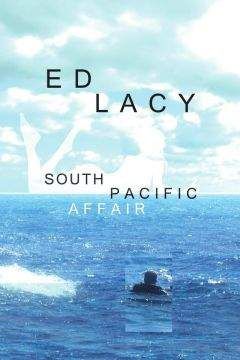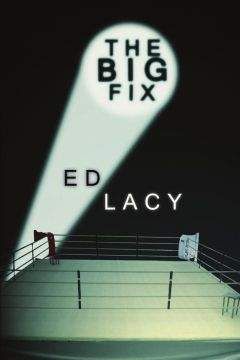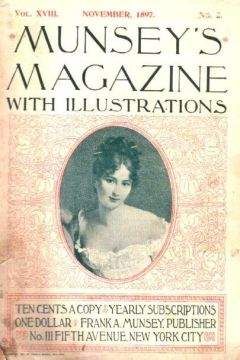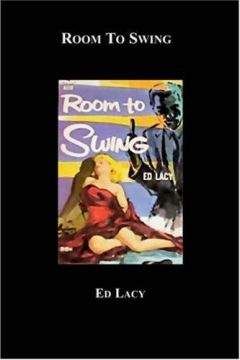Ed Lacy - South Pacific Affair

Скачивание начинается... Если скачивание не началось автоматически, пожалуйста нажмите на эту ссылку.
Жалоба
Напишите нам, и мы в срочном порядке примем меры.
Описание книги "South Pacific Affair"
Описание и краткое содержание "South Pacific Affair" читать бесплатно онлайн.
It seemed a paradise, every man's dream come true. Yet after a while, maybe four or five days, I had to admit I was bored. I didn't know exactly what I wanted to do, except I wanted to do something. There wasn't a lick of work to be done, no problems, no need for even getting up if I didn't feel like it. Yet I was restless, jumpy. It frightened me because I could see the same thing happening if we were together on Numaga... this stupid restlessness building up till I did something crazy to hurt her—like taking off, or losing myself in a bottle. I tried to talk myself out of it, began lying awake at night and telling myself there were millions of men in the world tied in knots by tension and worry who would give an arm for what I had. But it seemed as if I had too much of peace and quiet. Not too much of Ruita; two people were never as intimate, sharing every second of the other's life—I wasn't tired of Ruita. It was simply this gnawing rotten feeling of wondering what was going to happen next in a little world where nothing was ever going to happen.
One morning after we had taken our swim—and bath— in the lagoon and were walking along the beach to dry off, I began to trot, then to run. Ruita ran with me, not the knock-kneed jerky style most girls use, but with long firm strides. We circled the island several times, running like sprinters, sweating and fighting for air. I was pooped and dropped to the sand, trying to get my breath back. Ruita walked around slowly, her chest heaving. Finally we both took a dip and lay on the sand. After many minutes of silence she asked, “Why did you run like that?”
“I don't know. I guess I wanted to tire myself out.”
“But why do you wish to tire yourself?”
I-shrugged. “Sometimes a man simply wants to exercise.” Of course I was lying. I'd run because I suddenly felt I had to do that stupid something, have some action.
She didn't say anything and I turned over to give my stomach a chance to dry. She laughed and ran a finger over the deep tan of my middle, said, “Now you are like an islander, like us.”
I wanted to say, “I wish I were,” but instead I merely asked, “Speaking of the islanders, how soon do we have to go back to the others, to Forliga?”
Ruita sat up. “Aren't you happy here, Ray?”
“Can you doubt my happiness?” I asked, pulling her to me, feeling the smooth coolness of her skin against mine. “It's... uh... just... Eddie will be expecting me. And Nancy must be wondering...”
“We do not ever have to return. If we wish we can stay right here for the rest of our lives.”
“You mean that?” I asked, floored by the idea.
“What reason is there for us to return?” Ruita asked, using French as she always did when excited or rattled. “Oh, Mama will come out to visit us and so will Eddie. But we have land, food, shelter, and each other. That is enough for a good life. In time we'll probably have children and be even happier.”
Holding her close to me, I looked into her cool eyes as I asked, “Would you be content with that?” And I told myself that there wasn't any real reason why we shouldn't stay here and be happy, yet I knew I'd blow my stack if I had to spend another week in this solitude.
She said, “Darling, if you want, I would try it—”
“No, honey, that isn't what I asked. Look, in a crazy confused way, your answer is very important to me. Is this what you want most, our remaining on this islet?”
She shook her head. “No. What I want most is to live on Numaga with you.”
“Why there instead of here?”
“Mainly because there is more to do there. In time I would get a little bored here.”
I kissed her. “Thanks! You've taken a load off my mind. This... uh... bored stuff was making me think I was cracked.”
She kissed me, little, light, hot kisses. “Is that what troubles you, you are bored with me?”
“Nothing troubles me.”
“Oh, yes. Something worries you, Ray. I feel it. This small drawing back, this unknown thing holding you apart from me at times.”
“That's nonsense. You dream it,” I lied, and then and there I made a large mistake. For if I had told her the truth we might have talked it out, saved both ourselves months of unhappiness. “What are you handing me, this East is East and never the... whatever it is... shall meet, slop?”
She tried to pull away from me, her eyes angry, but I held her tightly. She said, “That is a... a... mean thing, a cruel thing to say. We have found in our being together the greatest contentment I will ever know. Surely you must feel the same way.”
“Forgive me, I was trying to be clever. A minor Western sickness—we must make clever talk all the time. Darling, there's no need to twist words. I have been a little restless here because I'm not conditioned to lying around all day. Although I try to deny it, I suffer from another form of sickness—a reflex known as work.”
She kissed me, then laughed, her warm breath fanning my lips. “My Ray, do not sound so ashamed. No one can live in... this scientific name I learn years ago... yes, in a vacuum. One of your silly popaa words that—”
“Don't say 'your'—it puts a thin wall between us.”
She nodded, her black hair brushing my forehead and eyes. “I am sorry. I do not wish even a cobweb between us. Now do not be angry if I use another popaa saying I learned in school—all work and no play makes Jack a dull chap. And the same goes for all play. But here we have no difference between work and play. The thing is to have a number of ways to play. You understand me?”
“Aha.”
“Aha?” she repeated. “What does that mean?”
“A slang way of saying yes.”
“Ah, I have heard much of this slang, some day you will teach it to me. Back on my island we will each have many things to teach the other. We will not only have what we have here, but also a fine house that needs little daily care, and an ice box in which many kinds of foods may be stored. And we will have a radio to be smug about the news of the peoples outside our island. Also, there will be my pearl cultures, which take up much time and are a wonderful game. We have many books and magazines, records, boats, and if we wish, we can do some 'work' by making copra. Oh yes, and there will be other people around us—not too many to spoil our privacy, but they have problems, gossip, and that is interesting. Now and then we shall go to Papeete, see the awful movies and the swaggering drunken tourist popaas, and we will be disgusted, happy to run back to Numaga again. Now, I have been waiting for you to say it first, but I will— shall we go back to Forliga?”
I nodded. She moved in my arms and I said, “But I think we have one or two things still to do.”
Late in the afternoon we put on our clothes and left the islet—not without some regret on my part, regret mixed with relief—and paddled back to Forliga. Passing the Hooker, I saw how low she was in the water, knew we had a full hold of copra. We put the canoe up on a wooden rack and waded ashore. Some kids told us Nancy was in the guest hut. Eddie was also there, along with the Chief, and several other islanders. They greeted us with the greatest casualness, as if we had merely returned from an hour's sail.
The radio in Titi's hut next door was playing a watered-down version of “La Jazz Hot” but we could barely hear it. He had probably shot his batteries playing the set all during the wedding feast. Nancy kissed Ruita and merely asked, “How are you, dear?”
“Fine, Mama. How is Titi's wife?”
“Very good and very large. I think she will have twins.”
Eddie slapped me playfully in the gut, said, “Got the boat loaded. Damn copra is almost turning rancid.”
The old guy with the rusty outboard shook my hand, said he had been waiting for me to fix his motor. I told him, “I hope I'll have the time. With a full hold, we will sail soon, take the Adams' home to—”
“You'll have time,” Eddie cut in. “There's a smallpox epidemic going around. The governor in Papeete has ordered all boats- to stay in port till further notice.”
“When did that start?” I asked, as though it made any difference when it started.
“We heard it on the wireless last week,” Nancy said. “Started in the Cook Islands. So far there have only been a few deaths and I suppose they'll have it under control if they can keep it from spreading.”
Cumber, the Chief, said a fast prayer in Tahitian, the other joining him; every family in the atolls had lost one or more people in the last great epidemic—flu. There was a moment of sad quiet broken by Ruita saying, “I look forward to staying here. Mama, I am hungry for rice and bread and...”
Cumber said softly, “We have only fish and fruits—and nuts. The wedding emptied the store and of course there hasn't been a trading vessel since then.”
I looked at Eddie and he shook his head. “Every can of food on the Hooker has been sold days ago.”
I caught Ruita's eyes and we both smiled—admitting for the first time how tired we'd been of our nut and fish diet on the islet.
I went down to the boat, to change from my “good” clothes —now slightly mildewed and sun-bleached—to a pair of trunks. Eddie came along the dock, asked me to throw him a cigar. He said, “In the hot sun the stink is pure awful. Hope we-can get away before the copra really goes rotten. I'll take out my stuff later, so you and Ruita can use the cabin nights.”
We had supper in Titi's hut—of fish, nuts, and a kind of white starch so rubbery I could hardly chew it, much less swallow the damn stuff. Cigarettes were still plentiful, and we smoked and listened to the faint sounds of Titi's radio. Then Ruita and I walked down to the boat, like old married people, without either of us mentioning it. And nobody else mentioned it, either.
Exactly thirty-four days went by in peace and quiet—and I counted the days for I monitored the radio news each afternoon. Ruita and I lived aboard the Hooker, sharing our privacy only with the roaches and copra bugs. She even put curtains of old pareu cloth on the portholes to add the proper domestic touch. Each dawn we left the boat to escape the copra stink, and hung around the village and gossiped. Sometimes we took hand lines and went to the lagoon entrance, spread crushed hermit crabs on the surface to attract the fish, and would bring back a canoe full of big fish.
I carefully took the old man's outboard apart, working whenever I felt like it, always surrounded by a chattering and eager audience. None of the parts were broken and I carefully cleaned them, scraped the rust off, oiled everything. When I had it together again, the old duck wanted to use it at once, asked me for gasoline. We had a forty-gallon tank in the Hooker and while I could have spared a pint or so, I used all the oil I had cleaning the motor. I tried, without success, to explain to the old man that he needed lubricating oil in his gas, and that he must run the motor in a barrel of fresh water as soon as he removed it from his canoe. Although he didn't like the idea he agreed to wait till a trading schooner appeared and he could get oil.
I was not only the master mechanic of Forliga—I also repaired bicycles—but the center of great interest for another reason. Each day we gathered around Titi's faint radio to hear the latest news from Papeete. The smallpox had spread to another of the Cook Islands, and several mild cases had appeared on Mopelia, due to some Rarotonga islanders making a long canoe trip there and carrying the germs. The ban on travel still stood, and the radio announced the Rarotongans would be jailed—some day.
The Chief, as part of his duties, listened to the news and then reported it to others, but by the time it had spread around, it was so distorted it didn't make sense. For example, gossip on Forliga had it that the Rarotongans had already been shot, and since they were from a British Island, war was certain between France and England. To simplify matters, I began taking the news down in shorthand—which floored everybody, including Ruita and her mama. Nobody could understand how the “worm,” as they called my shorthand figures, could possibly have any meaning. Several times a day I would be stopped on the village street, and asked to “please read the worms.” I'd take out my little battered notebook and read the latest news on the smallpox.
Ruita was so impressed at this odd “language,” I sat up half of one night trying to tell her how it worked, what the job of a court reporter was like. This started us on a long discussion of crime, something the island mind couldn't conceive of. Why should a man have to steal food when there was so much in the sea and on the trees, and if he did, why punish him? He was hungry.
Early one morning there was much blowing of conch shells and children racing through the village shouting that a schooner was coming. Everybody trooped across to the sea side of the atoll and there, still a good many miles off, was a large schooner. She was too far away to see clearly and of course nobody had any glasses. Cumber swore he had a pair “someplace” and even sent two of his daughters to look for them, till his wife reminded him he had sold them to a schooner sailor months ago for cigarettes and a silver cocktail shaker.
Cumber said, “It is strange. The ban on travel still exists, yet here is a schooner. Maybe it is good. At least we will be able to buy flour and tinned foods.”
“Perhaps it is a ship from Australia and they know nothing of the ban,” Ruita suggested.
Eddie, who had his hands to his eyes and was staring hard, like an old tar, said, “Naw, why should a ship from Australia be making directly for this atoll? Have to pass the Austral Islands and they would be stopped there. That's an island schooner, all right. I've seen those lines before.”
“No island boat would dare violate the government ban,” Cumber said, the voice of authority.
After much talk and speculation, we all went back to the village for coffee—without milk or sugar—and then returned to watch the schooner. By this time she was closing in on the atoll and Eddie shouted, “Hell, that's the Shanghai!”
Подписывайтесь на наши страницы в социальных сетях.
Будьте в курсе последних книжных новинок, комментируйте, обсуждайте. Мы ждём Вас!
Похожие книги на "South Pacific Affair"
Книги похожие на "South Pacific Affair" читать онлайн или скачать бесплатно полные версии.
Мы рекомендуем Вам зарегистрироваться либо войти на сайт под своим именем.
Отзывы о "Ed Lacy - South Pacific Affair"
Отзывы читателей о книге "South Pacific Affair", комментарии и мнения людей о произведении.



















